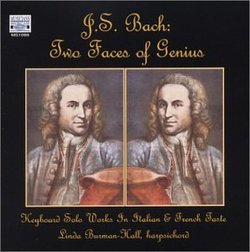*Three* faces of Genius
Max Schmeder | New York, NY | 11/29/2003
(5 out of 5 stars)
"Here is a recording by my former harpsichord teacher, and while I can't claim to be completely objective, I am an incorrigible snob and notoriously disloyal. Hopefully, that will encourage you to trust my positive review of this cd by my wonderfully wonderful teacher.Truth be told, I've never warmed to the first movement of the Italian Concerto. Those crashing chords at the outset give the wrong impression and usually inspire an edificial interpretation, as if the keyboardist thinks he is a mason working on a pyramid. The performance at hand, however, is remarkable for its plasticity, introduced in the first episode (:45) by a melting line where a choppy scale is usually heard, perfectly crystallizing what is different about this performance. The difference between watching a slinky descend a flight of steps versus an accidentally dropped vacuum cleaner.Out of two or three dozen performances I've heard, this is only the second one that I would recommend - the other one being Luc Beausejour's on Analekta thanks to some *finely* pruned articulation. But whereas the latter is blemished by an unexciting third movement, this one literally grows wings, rendering Italianate virtuosity in the finale like no other performance you will ever hear. Other favorite recordings of this third movement are Gould's classic 1961 CBS recording for its ballistic trajectory (not to be confused with either the 1954 CBC or the later digital version), and on harpsichord, Andreas Staier on DHM is a virtuosic third choice.There are quite a few excellent recordings of the Chromatic Fantasy and Fugue, but they're generally cut from the same cloth, emphasizing the psychotic element. Masaaki Suzuki on BIS is a good example, so is Pierre Hantai on Virgin - chaotic recitatives, guts hanging out all over the place - but the long emotional arc, painstakingly traced by Schenker, gets sacrificed.Here, however, the recitative beginning at 2:45 is not a cranky baby throwing a tantrum but a grandiloquent oration. In the conclusion, the pulse sinks palpably to the last note and ratchets down the movement beautifully. The effect is one of a wholesome purging, not of another knot in the stomach - my usual impression here. This Chromatic fantasy is the only one I would describe as "enjoyable" and, moreover, is the only one I would listen to twice in a single day, much less in a single week!The fugue is viscerally driven (4:35!), and the chromaticism given a mystical "slouching its way to Bethlehem" smear. Another compelling performance of this fugue is given by Robert Hill on Hanssler for its mounting power (the harpsichord, not his clavichord recording). Edwin Fischer's piano recording is not for thrill-seekers - his fantasia recitative is really a chorale prelude - but the fugue's counterpoint swims gorgeously in three dimensions and, as always with his Bach, the voicing fascinates.Even if there weren't two other excellently performed works (the French Overture and G-Major Toccata), this recording would be a must-hear for its unsurpassed Italian Concerto and Chromatic Fantasy. To find performances at this level, you would have to patch together movements from a small selection of elite artists. Combined on one midpriced cd, this is a steal.A word on the acoustics: the harpsichord is closely miked, and the courtly French Overture sounds best in a reverberant room. Spacious recordings of this work -such as Scott Ross's- have to be listened to through earphones for precisely the opposite reason or they sound watery.happy listening!
-Max Schmeder"


 Track Listings (16) - Disc #1
Track Listings (16) - Disc #1